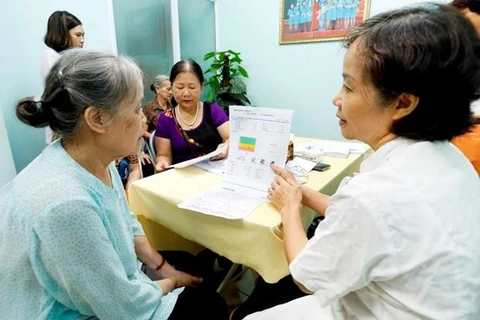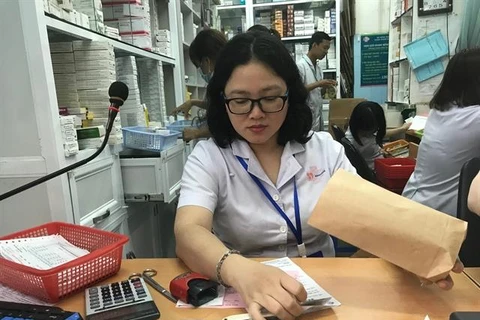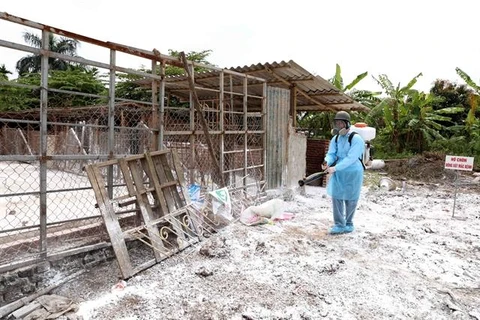 Nguyen Duc Chung (second, left) Chairman of the People's Committee of Hanoi, talks to Professor Joel Leroy at an event in Hanoi. (Photo: VNA)
Nguyen Duc Chung (second, left) Chairman of the People's Committee of Hanoi, talks to Professor Joel Leroy at an event in Hanoi. (Photo: VNA) Hanoi (VNS/VNA) - Hanoi's health sector has improved its service in recent years, aiming to decrease the amount of money Vietnamese spend on treatment overseas, a figure that currently amounts to about 2 billion USD annually.
Since 2016, the health sector has worked to attract foreign doctors and experts to come to Hanoi and transfer advanced medical technologies to local doctors and medical staff.
For example, the Hanoi-based Saint Paul Hospital has worked with 263 foreign medical experts from France, the US, Australia, Switzerland, Japan and the Republic of Korea for academic exchange and technology transfer.
Notably, the hospital received support from Professor Joel Leroy a top French endoscopy expert, Professor Bretagnol Frederic and other experts to establish the Hi-tech and Digestive Centre, specialised in endoscopic surgery and digestive treatment in 2016.
It was the first digestive centre of the city with advanced medical equipment and new technologies for digestive treatment.
Nguyen Dinh Hung, director of the hospital, said the hospital had implemented a range of advanced medical techniques, such as minimally invasive colon and rectal surgery; laparoscopic surgery for the treatment of ileosigmoid fistulas; transanal endoscopic microsurgery (TEM) and natural laparoscopic surgery leaving no scars.
Besides, Leroy also trained doctors at Duc Giang Hospital in Long Bien district to perform advanced medical techniques.
Hung said Leroy not only trained doctors at the hospitals but also performed difficult surgeries.
Leroy's first operation in Duc Giang Hospital was performed on a 76-year-old man, of Long Bien. The patient was taken to the hospital with symptoms of abdominal pain, bloating and vomiting. After being examined, the patient was diagnosed with a bowel obstruction due to colon cancer.
Under the instruction of Leroy, the tumour was successfully removed in just over an hour. The surgery was recorded and presented to the hospital’s meeting room so other doctors could watch it.
In the operation room, Leroy guided doctors on how to conduct open laparoscopy and explained how to perform minimally invasive colon and rectal surgery.
Later, in recognition of Leroy's contribution to the city’s health sector and Vietnam, late President Tran Dai Quang awarded him the Friendship Medal of the Socialist Republic of Vietnam in 2017.
Leroy is currently helping train doctors specialised in gastrointestinal laparoscopy for the city’s health sector as well as doctors for the hi-tech and digestive centre.
Another example of international co-operation is 108 Military Central Hospital. Doctors from the hospital worked with their colleagues in France’s Foch Hospital to conduct Vietnam's first lung transplant from a brain-dead donor in March 2018.
The leading partner of the hospital is now Japan, a country with some of the most developed medicine in the world. The hospital has sent doctors and technicians to training courses in Japan to improve the quality of examination and treatment.
Associate Professor Nguyen Anh Tuan, deputy head of the hospital’s Gastrointestinal Surgery Department, said after the training courses, doctors and technicians of the hospital had learned advanced techniques.
Tuan said doctors from the hospital now could conduct techniques for treating gastric and esophageal cancer just as doctors in Japan can.
Challenges remain
Data from the hi-tech and digestive centre show thanks to the improvement in service quality, the centre has received 20 -30 percent more patients each year since 2016.
Nguyen Ngoc Dan, a doctor from the centre, said there were patients diagnosed in Singapore’s hospitals but they returned to the centre for treatment because of the reasonable price and to be treated by reputable doctors, he said.
Statistics of local hospitals revealed most foreign patients chose to be treated in well-known hospitals, including Saint Paul, 108 Military Central and Bach Mai because of good service quality and the skills of doctors.
Despite initial results, challenges still remain, said director of the city’s health sector Nguyen Khac Hien.
Hien said international cooperation had only been carried out by some hospitals and focused on certain aspects, while many other hospitals and aspects had not enjoyed international co-operation.
He said a lack of staff with fluent foreign language skills was the major challenge. It caused limits in finding partners, negotiating and implementing international co-operation.
He said the city’s health sector would focus on improving foreign language skills for medical staff, he said.
Additionally, the sector hopes to seek international cooperation in building a general strategy to develop the city’s health sector to improve service quality. It also plans to construct new medical centres with advanced equipment equal to centres of developed countries and establish hi-tech medical centre, according to Hien./.
VNA






















